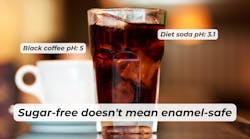Not worth the buzz? Energy drinks can cause significant oral health damage
It's not just Coke-it's Red Bull, too
We all know that sugary drinks are determintal to oral health—pop and other kinds of soft drinks (even if they're labeled "sugar-free!") can increase caries risk and erode tooth enamel, especially in young children and adolescents. But what about energy drinks? Brands like Red Bull and Prime can be great in a pinch, but giving consumers that extra boost to get through a particularly long workday may not be worth it in the long run.
In our increasingly hustle-centric culture, energy drinks have not only risen in popularity, but also garnered a negative reputation for health. They've been known to both cause and exacerbate a myriad of health problems, including dehydration, heart complications, anxiety, and insomnia.1
But as it turns out, energy drinks are also bad for our oral health. Despite their negative effects, they're the second most common dietary supplement used by young people in the US; about 30% consume energy drinks on a regular basis.2 In the UK, roughly one in three people between the ages of 25 to 34 have an energy drink every day.3 Forty-two percent of American adults also drink them regularly.4
Why energy drinks are harmful to our oral health
Due to their low pH and high sugar content, energy drinks can be detrimental to teeth and gums. Regular consumption can cause a roughly 2.4-fold increase in dental erosion-and may also lead to cervical dentin hypersensitivity by removing the smear layer of the teeth.2
Some energy drinks have up to 55 grams of sugar, which is almost twice as much as the recommended daily allowance for free sugars. Enamel erosion is irreversible and leaves the mouth susceptible to bacteria, decay, and cavities. Furthermore, regular energy drink consumption can inflame the roots of our teeth and cause bleeding gums.3
Preventing damage in adolescent patients
Due to their negative oral (and overall) health effects, it's important to counsel your younger patients of the dangerous side effects of energy drinks-especially with how easy they are to access.
Concerningly, up to 11.6% of secondary schools in some districts sell energy drinks in vending machines, school stores, and snack bars. Seventy-five percent of school districts nationwide do not have a policy to limit or control the distribution of these types of beverages being sold in high school vending machines and cafeterias.1
Enamel is the prime defense against tooth decay. Although avoiding energy drinks is the best way to prevent cavities and enamel erosion, patients that still choose to have them can still take precautions to protect their teeth. Encourage patients to chew a sugarless gum, drink lots of water to dilute any lingering acid, and refrain from brushing their teeth directly after drinking.3
References
-
The buzz on energy drinks. CDC Healthy Schools. Reviewed August 15, 2022. https://www.cdc.gov/healthyschools/nutrition/energy.htm
-
Alsunni AA. Energy drink consumption: Beneficial and adverse health effects. Int J Health Sci (Qassim). 2015;9(4):468-74. https://www.ncbi.nlm.nih.gov/pmc/articles/PMC4682602
-
Todd N. The effects of energy drinks on your teeth. Dental Negligence Team. November 28, 2018. https://www.dentalnegligenceteam.co.uk/blog/the-effects-of-energy-drinks-on-your-teeth/
-
Are energy drinks bad for your teeth and gums? Periodontal Health Center. 2021. https://periodontalhealthcenter.com/blog/how-energy-drinks-affect-teeth-and-gums/
About the Author

Sarah Butkovic, MA, BA
Sarah Butkovic, MA, BA, is an Associate Editor at Endeavor Business Media, where she works on creating and editing engaging and informative content for today's leading online dentistry publications. She holds a Master's English Language and Literature from Loyola University Chicago and is passionate about producing high-quality content that educates, inspires, and connects with readers.

